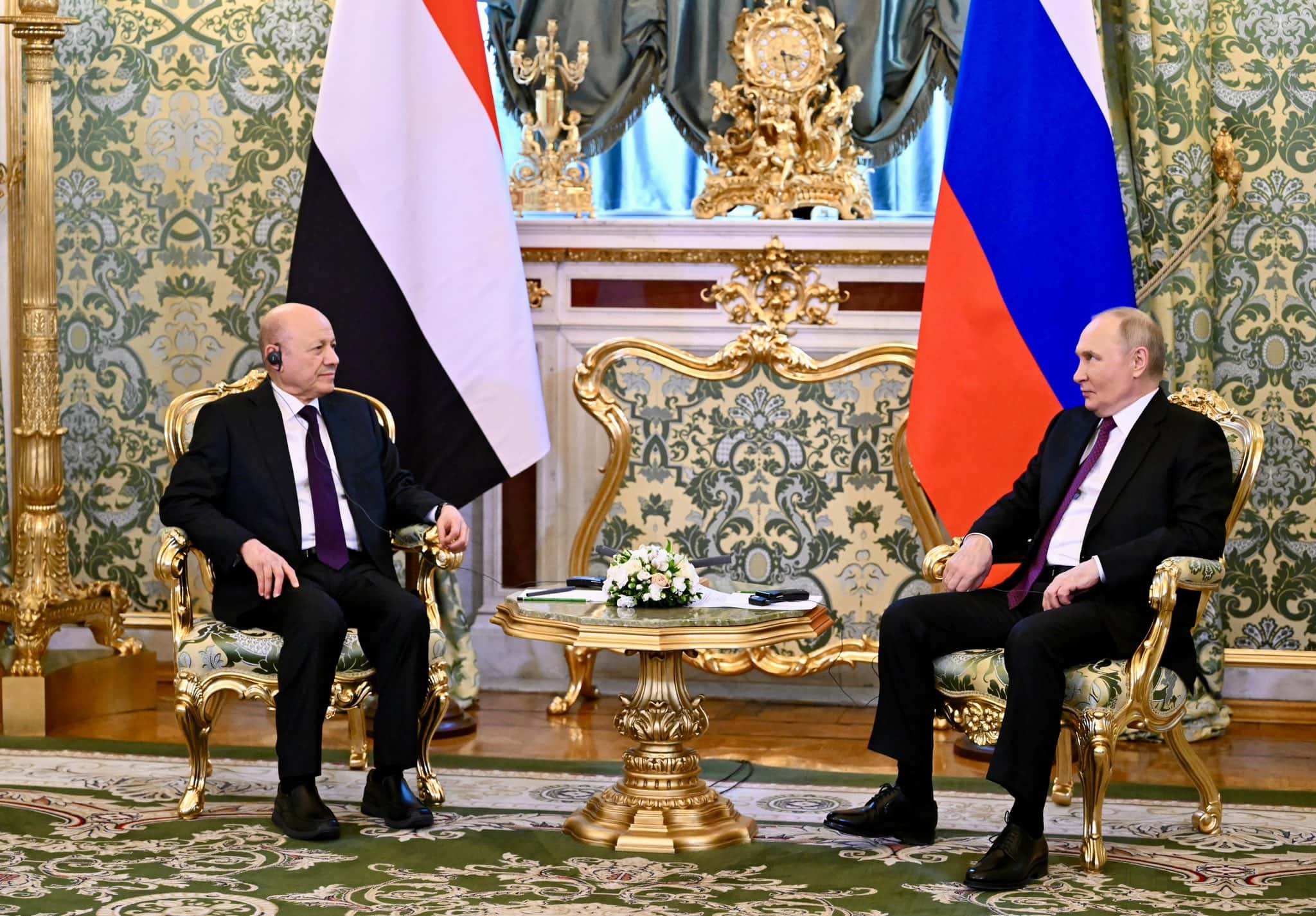
Yemeni Presidential Leadership Council President Rashad Al-Alimi meets with Russian President Vladimir Putin in Moscow, May 28, 2025 (official).
Last updated on: 29-05-2025 at 9 PM Aden Time
|
|
Moscow (South24 Center)
Yemen's Presidential Leadership Council Chairman Rashad al-Alimi met with Russian President Vladimir Putin at the Kremlin on Wednesday (May 28), marking the first official meeting between the two sides since the Council's formation in April 2022.
The meeting came during al-Alimi's official visit to Moscow beginning May 27, aimed at strengthening political and economic partnerships with Russia and encouraging Moscow to play a more active role in Yemeni affairs.
During their talks, President Putin praised the historical relations between the two countries. He affirmed Moscow's desire to deepen cooperation with Aden, noting that the annual trade volume between the two nations reaches approximately $400 million.
Putin highlighted promising opportunities for cooperation in agriculture, energy, mining, and fisheries, stressing the importance of reactivating the joint governmental committee and expanding technical and economic cooperation programs.
President Putin also invited the PLC Chairman to a Russia-Arab Summit being held in Moscow in October this year. “We hope that you will personally attend it. We will be delighted to see you in Russia again,” he said.
According to the Russian President, “the overwhelming majority of our friends in the Arab world” have agreed to attend the summit. “We are working together with the Arab League. Preparations for the summit are proceeding apace. We hope that it will benefit our relations with our friends in the Arab world,” he added.
The Russian president also referred to the training of Yemeni personnel in Russia as another part of the bilateral cooperation. He said that around 1,500 Yemenis are studying in Russia, with 400 of them receiving budget-supported education. He said this facet of cooperation was “creating conditions for communication” between their two peoples.
For his part, al-Alimi expressed appreciation for Russia's historical role in supporting Yemen during political transitions, as he noted that "the partnership between our countries was never merely diplomatic exchange, but enduring solidarity embodied in infrastructure, ports, hospitals, and educational institutes established by the Soviet Union in Yemen”.
Al-Alimi emphasized Yemen's desire to reactivate this role, particularly in what he described as the current "phase of resilience and recovery”.
In an appeal to the Russian President, he said: “We want Russia to assist us in restoring peace, stability, and security in Yemen, and in reestablishing a normal functioning republic. We oppose the militarisation of the Red Sea and the deterioration of relations with neighbouring countries.”
He expressed hope that the Russia–Arab Summit “will serve as a milestone, further advancing relations between the Arab world and Russia”.
He also voiced hope to see the Russian Embassy in Aden reopen shortly.
During a discussion on Thursday at the Russian Academy of Sciences' Institute of Oriental Studies, al-Alimi issued stark warnings about the Houthi project's dangers, describing the group as "an armed sectarian ideological organization based on the idea of divine right to rule, rejecting civil statehood and equal citizenship”.
Al-Alimi added: "It is a grave mistake to reduce the Houthi threat as merely a result of the Gaza war fallout. This group has practiced piracy, mine-laying, and targeting sea lanes for years, even during truces and negotiations."
He criticized what he called "misleading narratives" within some international think tanks that portray the Houthis as a political party amenable to peaceful settlement, arguing this view ignores the group's rigid ideology and its behavioral/organizational similarities to groups Moscow condemns, like AQAP and ISIS.
Earlier in the visit, al-Alimi met with Russian State Duma Chairman Vyacheslav Volodin, with both sides stressing the importance of strengthening legislative cooperation and exchanging parliamentary expertise to serve mutual interests.
In a symbolic gesture, al-Alimi laid a wreath at the Tomb of the Unknown Soldier near the Kremlin wall, where he witnessed an honor guard ceremony and a performance of Yemen's national anthem.
The visit comes as Yemen's government seeks to diversify its regional and international alliances. Russia has previously hosted delegations from various Yemeni parties including the Southern Transitional Council and the Houthi group.